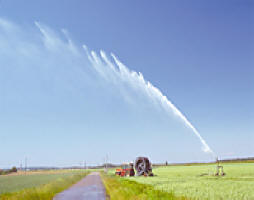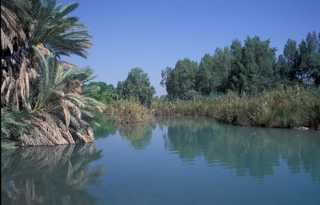 Palestine: West Bank residents face severe water shortage as drought continues
Palestine: West Bank residents face severe water shortage as drought continues
West Bank Palestinians are suffering a serious water shortage this year as a severe drought has exacerbated already existing supply problems, according to the head of the Palestinian Water Authority.
Shadad Ateli said since mid-May, many Palestinians have been going without water for hours, and sometimes days at a time, because of a reduced supply as a regional drought enters its fifth year. He called on Israel, which controls some 90 percent of water sources in the West Bank to rethink its water policies. "Water shouldn’t be a part of the conflict. It should be divided according to human needs equally," Ateli said.
Uri Shani, spokesman for Israel’s Water Authority, says Palestinians are receiving more water than their agreed share under an interim peace deal. The drought has affected Israel as well, with fresh water supplies below their acceptable minimum, but there have been no cases of community water supplies being cut off.
A recent report by Israeli human rights group B’Tselem described water distribution as unfair and called on Israel to rectify the constant shortage of water in the West Bank.
In the city of Nablus, residents report only receiving running water once a week. In the nearby village of Salem, there hasn’t been running water for months and a nearby well is going dry. Residents there say they pay for expensive water brought in by tanker truck.
Most Palestinians have already used up water they conserve from rainfall in large rooftop barrels, B’Tselem reported.
Under an interim agreement signed with the Palestinians in 1995, Palestinians receive an allocated supply from Israel. Every summer, there are shortages, but this year the problem is made much worse by a fifth year of continuing drought, Ateli said at a news conference in Ramallah.
Palestinian negotiators had expected to work out a better water deal in a final status agreement that was meant to be concluded in 2000. Instead, fighting broke out between Israel and the Palestinians, and eight years later, the water allocation system has remained as it was.
Ateli said Israel allows Palestinians to drill limited amounts from two West Bank aquifers - but this year, they could only drill 105 million liters instead of 118 million liters in previous years because one of the aquifers is drying up. Israel’s national water company also sells Palestinians another 50 million liters of water.
Current peace talks between the two sides have not touched on water sharing yet, said Ateli, who is representing the Palestinians in negotiations on water with Israel.
West Bank residents use around 15 gallons of water a day, two-thirds of what the World Health Organization recommends for urban needs. In northern villages that number drops to 7 gallons a day. Daily water consumption in Israeli cities is 60 gallons per capita, B’Tselem reported.
Shani said the Palestinian Authority was not cracking down on herders who steal water supplies - a problem Palestinians acknowledge - and could recycle waste water for agriculture, as Israel does. He said that could boost supplies from 30 to 40 million cubic liters. The only solution to this problem is creating more water, Shani said.
| Contact information | n/a |
|---|---|
| News type | Inbrief |
| File link |
http://www.palestinemonitor.org/spip/spip.php?article550 |
| Source of information | Agence France-Presse (AFP) |
| Keyword(s) | water shortage, drought |
| Subject(s) | POLICY-WATER POLICY AND WATER MANAGEMENT , RISKS AND CLIMATOLOGY , WATER DEMAND |
| Relation | http://www.haaretz.com/hasen/spages/1005890.html |
| Geographical coverage | Palestine, Israel |
| News date | 19/08/2008 |
| Working language(s) | ENGLISH |
 you are not logged in
you are not logged in





